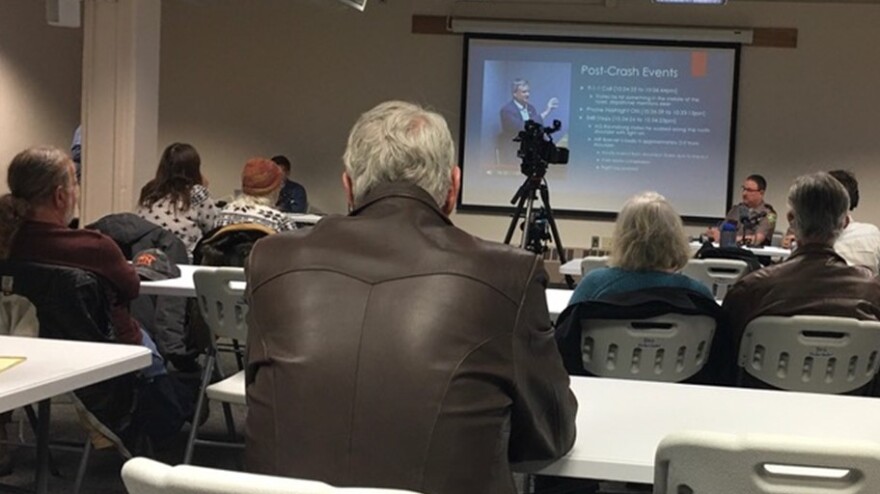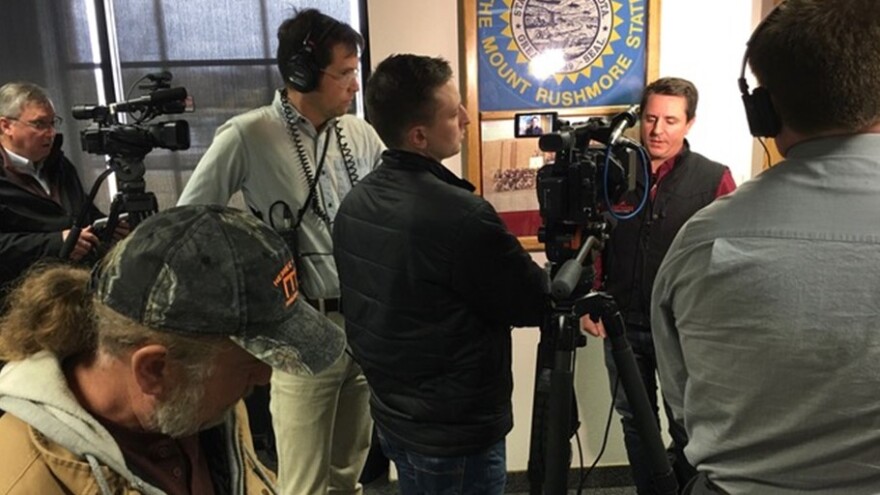Wait, what?
I know, “Wait, what?” is a cliche in today’s lexicon. But it fit.
The special South Dakota House committee formed to investigate whether state Attorney General Jason Ravnsborg should be impeached refused to hear a key piece of evidence: a presentation by South Dakota Highway Patrol officers who investigated the car-pedestrian accident that killed 55-year-old Joe Boever.
Ravnsborg was at the wheel on the night of Sept. 12, 2020, when the accident occurred just west of Highmore.
I didn’t realize the impeachment-inquiry committee hadn’t seen and heard the detailed Highway Patrol presentation until last week, when two Highway Patrol officers presented it to about 30 members of the South Dakota House, three of whom attended in person and the rest virtually.
That was my “Wait, what?” moment.
Mary and I stopped in Pierre on the way to spend a few days in Highmore, Mary’s hometown. We missed most of the presentation by Trooper John Berndt and Sgt. Kevin Kinney in the Capitol Lake Visitor’s Center near the state Capitol. But we caught the follow-up questions and the officers’ answers.
Three House members — Rep. Tim Goodwin, Rep. Dean Wink and Rep. Will Mortenson — attended the briefing in person. More than two dozen more House members were in virtual attendance.
Reporters were there, too, as was Boever’s widow, former mother-in-law and cousins Nick and Victor Nemec. Only legislators were allowed to ask questions of the Highway Patrol officers after their presentation.
At some point, that’s when I learned that the House committee charged with making a recommendation on impeachment declined the chance to hear and see the Highway Patrol presentation.
It wasn’t the first time in this whole mess with Ravnsborg’s faulty driving and Boever’s tragic death that I’ve been flabbergasted. It probably won’t be the last.

Kinney told SDPB’s Lee Strubinger and other reporters Wednesday that they had the presentation prepared and ready to go for the House committee but were turned down.
“We weren’t allowed to give the presentation or the overview of what our investigation entailed,” he said. “We were only allowed to answer the questions they had in regards to Attorney General Ravnsborg’s crash.”
Which seems, well, crazy, if the committee — or at least its decision-making leaders — were really serious about making a decision on the impeachment based on all the facts.
Goodwin put it more strongly, saying it was “an absolute crime” that the select committee didn’t see the presentation.
Without the benefit of the Highway Patrol presentation, the nine-member committee did make a decision in late March, which was to recommend that Ravnsborg not be impeached. The vote was 6-2, with six Republicans voting against impeachment and two Democrats voting for it.
The Democrats filed a minority report, which said the case against Ravnsborg made by law enforcement was credible and compelling and showed that impeachment was warranted. Investigators said all four wheels of Ravnsborg’s Ford Taurus were outside the rumble strips at the outside edge of the driving lane when he hit Boever, who was walking on the shoulder and carrying a flashlight that was turned on.
Essentially, the Democrat’s one-page minority report adopted law enforcement’s position.
The Republican majority on the committee didn’t agree in a 20-page majority report against impeachment.
For reason’s I still don’t really understand, House Speaker Spencer Gosch, who served as chairman of the committee, didn’t vote, saying he would only vote in the event of a tie.
But what I really don’t understand is why all members of the committee wouldn’t want to see all of the most pertinent information. And surely the Highway Patrol report was high on the list of the most pertinent information.
Gosch has cautioned against rushing to judgment in the Ravnsborg case, which is always good advice. Gosch also has also questioned why Gov. Kristi Noem and the Department of Public Safety, including Secretary Craig Price, have pushed so hard for Ravnsborg to be removed from office.
Noem has been out front in criticism of Ravnsborg and, at times, has extended that criticism to both the criminal and legislative process tied to the case. In February of 2021, Noem ordered the release of a report by two investigators from North Dakota interrogating Ravnsborg after the crash. After viewing hours of the video, she called for Ravnsborg to resign.
Shortly after that, Judge John Brown ordered state officials to remove the video from the internet, saying it could prejudice the criminal case. The attorney general eventually pleaded no contest to two misdemeanor charges, paying a few thousand dollars in fines and court costs.
He didn’t serve any jail time or have any jail time suspended. Brown initially imposed an order requiring Ravnsborg to do annual public events on distracted driving. But he later determined, after Ravnsborg’s lawyer objected, that the nature of Ravnsborg’s plea arrangement didn’t allow for the community service requirement.
So that was that, on the criminal side.
And early last fall, Ravnsborg reached a settlement in a wrongful-death civil suit brought by Jenny Boever, Joe Boever’s widow. The terms of the settlement were kept confidential.
Ravnsborg continues to dismiss suggestions that he resign and seems to leave open the possibility that he will seek the Republican nomination for another term as AG at the GOP convention this summer. Pierre lawyer Marty Jackley, who served 10 years as state AG and also served as U.S. attorney for South Dakota, is running for the AG job again and has been endorsed by Noem.
The impeachment question isn’t yet settled, however. It will come before the full South Dakota House of Representatives tomorrow (Tuesday), when members will consider the special committee’s recommendation against impeachment and a counter move to impeach the attorney general.
Republican state Rep. Will Mortenson of Pierre filed a resolution of impeachment against Ravnsborg today (Monday). A draft of Mortenson’s resolution was circulated among legislators last week.
It accuses Ravnsborg of causing’s Boever’s death by illegally driving outside the proper lane and by being dishonest with investigators and the public about what happened.
Impeachment in the House would require a majority vote. Then it would take a two-thirds vote by the state Senate to find him guilty and kick him out of his job.
Word from several House members is that the vote there is likely to be close.
However it turns out, at least some House members have the benefit of a more complete picture of the case for impeachment, since they actually saw the Highway Patrol presentation.
Finally.


